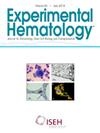CREB3L1参与了JAK2第12外显子突变诱导的红细胞生成。
IF 2.1
4区 医学
Q2 HEMATOLOGY
引用次数: 0
摘要
CREB3L1 是一种编码内质网应激转导子的基因,在骨髓增殖性肿瘤(MPN)患者的血小板 RNA 中特异性过表达。然而,CREB3L1 过表达的病理生理作用仍不清楚。在本研究中,我们旨在研究 MPN 患者红细胞(RBC)中 CREB3L1 mRNA 的表达及其在红细胞增多症中的作用。在携带 JAK2 第 12 号外显子突变的真性红细胞增多症(PV)患者的红细胞中仅观察到 CREB3L1 表达升高,而在携带 JAK2 V617F 突变的患者或对照组中则未观察到。在红细胞生成过程中,从 JAK2 第 12 号外显子突变患者采集的骨髓细胞的红细胞中,CREB3L1 的表达被急剧诱导。使用 JAK2 第 12 号外显子突变的造血干细胞和祖细胞(HSPCs)在体外诱导红细胞生成时,这一点也很明显。有趣的是,在血清促红细胞生成素(EPO)水平超过100 mIU/mL的反应性红细胞增多症患者的红细胞中观察到了CREB3L1的过度表达。在一名急性红细胞性白血病患者的红细胞中也观察到 CREB3L1 表达升高。在体外由HSPCs分化而成的红细胞中,CREB3L1的EPO依赖性诱导非常明显,与驱动基因突变状态或MPN发病机制无关。这些数据有力地表明,RBC 中 CREB3L1 的过度表达与 EPO 受体及其下游分子 JAK2 的过度激活有关。这些结果表明,在 JAK2 第 12 号外显子突变或高水平 EPO 的情况下,红细胞生成需要 CREB3L1,它可能是通过拮抗细胞压力来实现的。本文章由计算机程序翻译,如有差异,请以英文原文为准。
Involvement of CREB3L1 in erythropoiesis induced by JAK2 exon 12 mutation
CREB3L1, a gene encoding the endoplasmic reticulum stress transducer, is specifically overexpressed in platelet RNA from patients with myeloproliferative neoplasms (MPNs). However, the pathophysiological roles of CREB3L1 overexpression remain unclear. In the present study, we aimed to study CREB3L1 messenger RNA (mRNA) expression in the red blood cells (RBCs) of patients with MPN and its role in erythrocytosis. Elevated expression of CREB3L1 was exclusively observed in the RBCs of patients with polycythemia vera (PV) harboring JAK2 exon 12 mutations, but not in those harboring JAK2 V617F mutation or control subjects. In erythropoiesis, CREB3L1 expression was sharply induced in erythroblasts of bone marrow cells collected from patients with JAK2 exon 12 mutation. This was also evident when erythropoiesis was induced in vitro using hematopoietic stem and progenitor cells (HSPCs) with JAK2 exon 12 mutation. Interestingly, overexpression of CREB3L1 in RBCs was observed in patients with reactive erythrocytosis whose serum erythropoietin (EPO) levels exceeded 100 mIU/mL. Elevated CREB3L1 expression was also observed in the erythroblasts of a patient with acute erythroid leukemia. EPO-dependent induction of CREB3L1 was evident in erythroblasts differentiated from HSPCs in vitro, regardless of driver mutation status or MPN pathogenesis. These data strongly suggest that CREB3L1 overexpression in RBCs is associated with hyperactivation of the EPO receptor and its downstream molecule, JAK2. Short hairpin RNA (shRNA) knockdown of CREB3L1 expression in HSPCs blocked erythroblast formation in vitro. These results suggest that CREB3L1 is required for erythropoiesis in the presence of JAK2 exon 12 mutation or high level of EPO, possibly by antagonizing cellular stress.
求助全文
通过发布文献求助,成功后即可免费获取论文全文。
去求助
来源期刊

Experimental hematology
医学-血液学
CiteScore
5.30
自引率
0.00%
发文量
84
审稿时长
58 days
期刊介绍:
Experimental Hematology publishes new findings, methodologies, reviews and perspectives in all areas of hematology and immune cell formation on a monthly basis that may include Special Issues on particular topics of current interest. The overall goal is to report new insights into how normal blood cells are produced, how their production is normally regulated, mechanisms that contribute to hematological diseases and new approaches to their treatment. Specific topics may include relevant developmental and aging processes, stem cell biology, analyses of intrinsic and extrinsic regulatory mechanisms, in vitro behavior of primary cells, clonal tracking, molecular and omics analyses, metabolism, epigenetics, bioengineering approaches, studies in model organisms, novel clinical observations, transplantation biology and new therapeutic avenues.
 求助内容:
求助内容: 应助结果提醒方式:
应助结果提醒方式:


